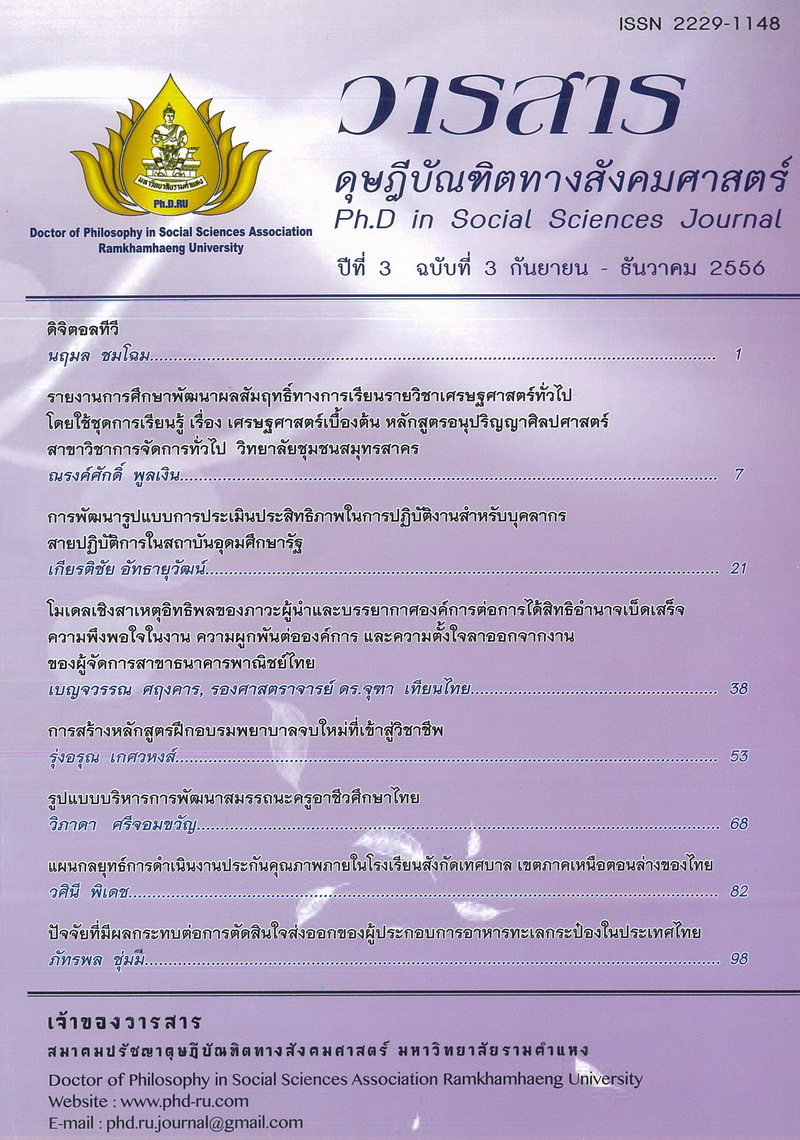โมเดลเชิงสาเหตุอิทธิพลของภาวะผู้นำและบรรยากาศองค์การต่อการได้สิทธิอำนาจเบ็ดเสร็จ ความพึงพอใจในงาน ความผูกพันต่อองค์การ และความตั้งใจลาออกจากงานของผู้จัดการสาขาธนาคารพาณิชย์ไทย
Main Article Content
Abstract
THE CAUSAL MODEL OF LEADERSHIP AND ORGANIZATIONAL CLIMATE ON THE EMPOWERMENT,JOB SATISFACTION,ORGANIZATIONAL COMMITMENT AND INTENTION TO LEAVE OF BRANCH MANAGER OF THAI COMMERCIAL BANKS
To develop a causal model of leadership and organizational climate applied to the empowerment, job satisfaction, organizational commitment, and intention to leave of branch managers of Thai commercial banks. The variables studied consisted of the independent variables of branch manager leadership involving the factors of transactional leadership, transformational leadership, and organizational climate. The intervening variables investigated were the structural factor influencing empowerment and the psychological factors of job satisfaction and organizational commitment. The dependent variable was the intention to leave. In this quantitative research investigation, the researcher used a questionnaire as an instrument of research, copies of which were used to collect data from 568 branch managers of Thai commercial banks. Using techniques of descriptive statistics, the researcher analyzed the data collected in terms of percentage, mean and standard deviation. The method of structural equation modeling (SEM) was also employed by the researcher. Findings are 1.) Leadership and organizational climate exhibited positive direct influence on empowerment. 2.) Transformational leadership and organizational climate displayed positive direct influence on the structural factor influencing empowerment. 3.) Transformational leadership and organizational climate evinced positive direct influence on the psychological factor influencing empowerment. 4.) Transformational leadership, the structural factor influencing empowerment and the psychological factor influencing empowerment manifested positive direct influence on the branch managers. 5.) Leadership, organizational climate, the psychological factor influencing empowerment, and job satisfaction exerted positive direct influence on the organizational commitment of branch managers. 6.) However, transactional leadership and organizational commitment exhibited negative direct influence on the intention to leave of branch managers.
Article Details
Academic articles, research articles, and book reviews in the Ph.D. in Social Sciences Journal are author’s opinions, and not the publisher’s, and is not the responsibility of the Ph.D. in Social Sciences Journal Philosophy Association, Ramkhamhaeng University. (In the case that research is done on human, the researcher has to be trained in Ethics for Doing Research on Human Training and has to produce the evidence of the training).


